Posts Tagged ‘Justice’ (20 found)
ACSC/APF 2014 Post Conference Report
As a member of the Association of Southeast Asian Nations (ASEAN), Myanmar accepted the gavel that symbolizes the ASEAN presidency. This was a historic moment since this is the first time Myanmar has taken the Chair since it became a member of ASEAN. As Chair, Myanmar is responsible for hosting many important regional forums and events during 2014.
The ASEAN Civil Society Conference (ACSC), also known as the ASEAN Peoples’ Forum (APF), is held independently by the ASEAN Chair country in advance of, and parallel to, the official ASEAN Summit, which is attended by ASEAN and regional leaders. The first ACSC/APF took place in Malaysia in 2005. Since then it has taken place in the Philippines (2006), Singapore (2007), Thailand (2009), Vietnam (2010), Indonesia (2011), Cambodia (2012), Brunei (2013) and this year in Myanmar (2014). The 10th ACSC/APF took place on 21 – 23 March 2014 at the Myanmar Convention Center in Yangon, Myanmar.
• • •Navigating Paths to Justice in Myanmar’s Transition
Since President Thein Sein and his government took office in 2011, Myanmar’s transition has unfolded at a pace that has surprised many and earned the acclaim of western governments, financial institutions, and private-sector investment analysts.1 The Burmese population of approximately 60 million has endured more than a half-century of military dictatorship, armed conflict, economic dysfunction, and political repression.2 A meaningful transformation into a peaceful society that enjoys economic development and functions democratically now seems plausible, though it is far from guaranteed. Ultimately, the blanket immunity afforded by the 2008 Constitution shields the acts attributable to prior regimes from any form of accountability.3 Whether the reform process will evolve to include measures that address the massive and systematic injustices of the past remains less certain.
• • •In Pursuit of Justice: Reflections on the Past and Hopes for the Future of Burma
Since 2011, Burma has begun to emerge from 50 dark years of dictatorship. Now, under President Thein Sein’s nominally civilian government the possibility has arisen for Burma to begin rebuilding and reconciling divided segments of the nation, and to provide justice to victims for decades of human rights abuses.
Burma’s minority ethnic communities have experienced grave human rights abuse at the hands of the SPDC regime and its strong arm of the Burmese military, or Tatmadaw. In order to transition successfully towards true democracy and national reconciliation, the Burmese government must address, and act upon, the specific needs expressed by victims of past abuse, documented and expounded herein, in order to move away from the abusive culture of the past towards a united future.
Within this report you will find a detailed history of Burma’ ethnic conflict, how that conflict has been sewn into the very fabric of the SPDC regime’s ideology and governing strategy, and ways in which the Tatmadaw has implemented the regime’s strategy by crippling livelihoods, physically and mentally abusing, and destroying the security of Burma’s minority ethnic communities […]
• • •အမ်ဳိးသမီးမ်ားအေပၚ စစ္တပ္က လိင္မႈဆုိင္ရာ အၾကမ္းဖက္မႈ ဆန္႔က်င္လႈပ္ရွားမႈအား အာဏာပုိင္မ်ား ႏွိပ္ကြက္ျခင္းကုိ ရပ္တန္႔ေပးေရး ေရဇြာ အမ်ဳိးသမီးအဖြဲ႔၏ သတင္းထုတ္ျပန္ခ်က္
ဇြန္လ (၁၀) ရက္ေန႔တြင္ အသက္ (၅၄)ႏွစ္ရွိ ေရဇြာ အမ်ဳိးသမီးတစ္ဦးအား ခလရ ၂၆၉ မွ တပ္မေတာ္သား တစ္ဦးက မုဒိမ္းက်င့္ ရန္ႀကိဳးစားရာ မိမိကုိယ္ကုိ ခုခံရာ တြင္ ျပင္းထန္စြာ ဒဏ္ရာရရွိခဲ့ၿပီး ေရဇြာ ျပည္သူ႔ေဆးရုံတြင္ ေဆးရုံတင္ကုသမႈ ခံလွ်က္ရွိပါသည္။ တပ္မေတာ္သားအား ဖမ္းဆီးထားၿပီး ျဖစ္ေသာ္လည္း ခါတုိင္း ကဲ့သုိ႔ပင္ အေရးယူမႈ တကယ္မလုပ္ပဲ လြတ္သြားမည္ကုိ ေဒသခံမ်ား အေနျဖင့္ စုိးရိမ္ေနၾကပါသည္။ ထုိ႔ေၾကာင့္ ေရဇြာ အမ်ဳိးသမီးအဖြဲ႔သည္ ဇြန္လ (၁၅၊ ၁၆)ရက္ေန႔ တြင္ ေရဇြာ ရဲစခန္းသုိ႔ စခန္းျပခြင့္ ေတာင္းယူခဲ့ၾကရာ အပယ္ခ် ခံခဲ့ရပါသည္ […]
• • •HURFOM Releases the Report of “In Pursuit of Justice: Reflections on the Past and Hopes for the Future of Burma”
In order for Burma to successfully transition towards genuine democracy and national reconciliation, the Burmese government must address, and act upon, the specific needs expressed by victims of past human rights abuse, says the Human Rights Foundation of Monland (HURFOM) in a report released this morning. The 90-page report, titled In Pursuit of Justice: Reflections on the past and hopes for the future of Burma, details the history of human rights violations perpetrated in Burma’s ethnic minority areas, and analyzes how to repair the relationship between the government and citizens to rebuild trust and move through a peaceful transition towards a united future Burma […]
• • •Same Impunity, Same Pattern: Sexual Abuses by the Burma Army Will Not Stop Until There is a Genuine Civilian Government
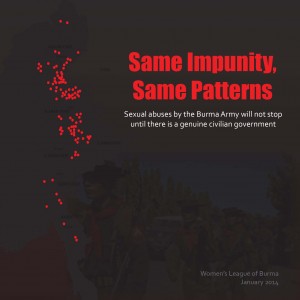 Almost a decade ago, the Women’s League of Burma (WLB) denounced systematic patterns of sexual crimes committed by the Burma Army against ethnic women and demanded an end to the prevailing system of impunity. Today WLB is renewing these calls. Three years after a nominally civilian government came to power; state-sponsored sexual violence continues to threaten the lives of women in Burma.
Almost a decade ago, the Women’s League of Burma (WLB) denounced systematic patterns of sexual crimes committed by the Burma Army against ethnic women and demanded an end to the prevailing system of impunity. Today WLB is renewing these calls. Three years after a nominally civilian government came to power; state-sponsored sexual violence continues to threaten the lives of women in Burma.
Women of Burma endure a broad range of violations; this report focuses on sexual violence, as the most gendered crime. WLB and its member organizations have gathered documentation showing that over 100 women have been raped by the Burma Army since the elections of 2010. Due to restrictions on human rights documentation, WLB believes these are only a fraction of the actual abuses taking place […]
Systematic Sexual Violence in Burma’s Ethnic Areas: New Report
Today marks the launch of an important new report documenting ongoing crimes of sexual violence-over 100 cases documented since 2010, including 47 gang rapes–perpetrated by the Burmese military in ethnic regions of Burma.
The Women’s League of Burma (WLB), consisting of thirteen women’s organizations representing different ethnic areas in Burma, released the report, “Same Impunity, Same Pattern: Sexual abuses by the Burma army will not stop until there is a genuine civilian government, “and is urging an immediate end to these atrocities […]
• • •Burma’s Ethnic Challenge: From Aspirations to Solutions
Important steps have been made in national reconciliation during the past two years. But promises and ceremonies will never be enough. The long-standing aspirations of Burma’s peoples for peace and justice must find solutions during the present time of national transition […]
• • •HURFOM Releases “Disputed Territory” to Highlight Unjust Land Acquisition in Mon Areas
The Human Rights Foundation of Monland (HURFOM) has released a report titled “Disputed Territory: Mon farmers’ fight against unjust land acquisition and barriers to their progress,” to illustrate contemporary struggles against past and on-going land disputes. Drawing from almost 100 interviews conducted in Ye, Yebyu, and Kyaikmayaw townships, the report presents cases of land confiscation and abuse in Mon areas and elevates the voices of farmers who are actively pursuing justice […]
• • •
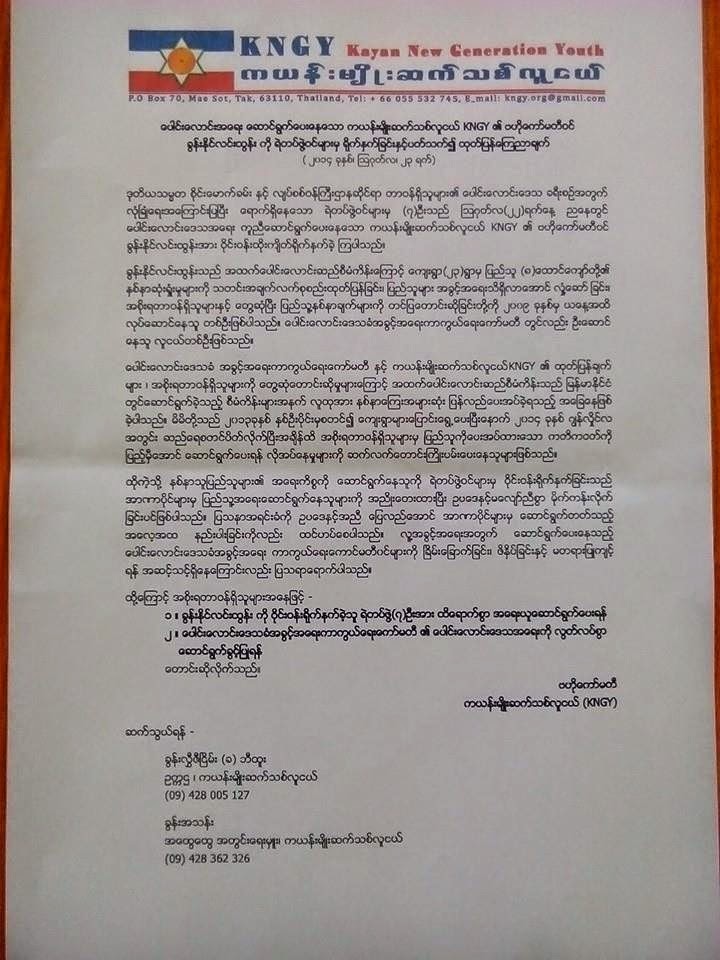
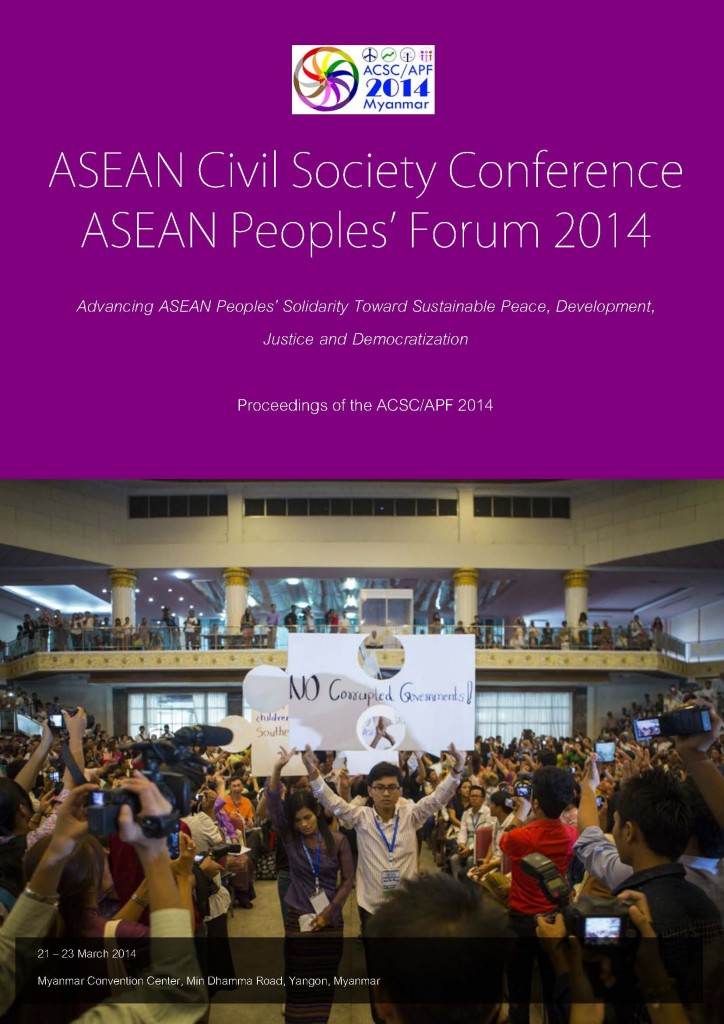
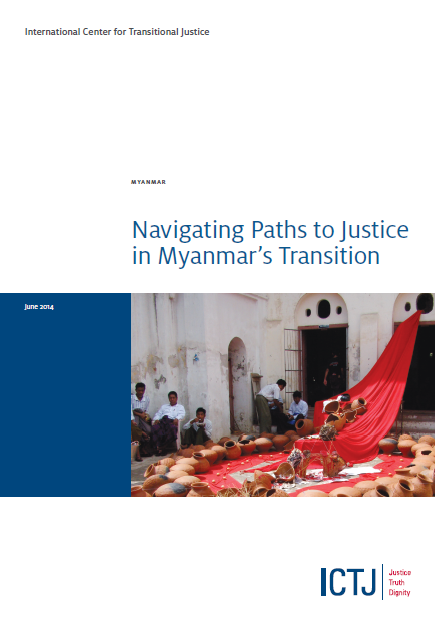
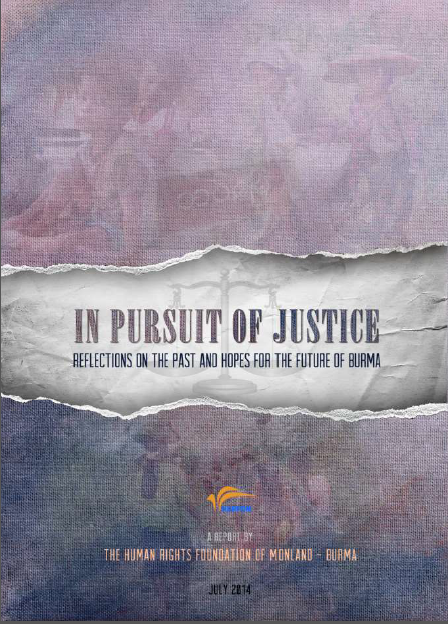








 All posts
All posts